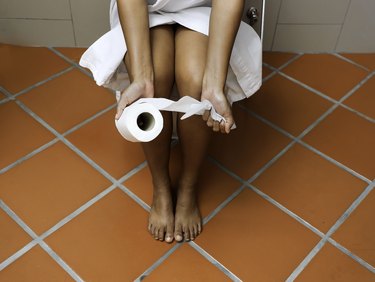
Paying attention to your stools can offer important clues about your overall health. One of the main symptoms of lactose intolerance is diarrhea, but other changes in your stools can be a sign of health conditions you may not have considered — some serious, and others not cause for concern.
Milk Allergy vs. Lactose Intolerance
Lactose intolerance is often confused with a milk allergy, but the two conditions affect digestion in different ways. A milk or dairy allergy is an immune response, so it does not affect your stools. Someone with a milk or dairy allergy can experience hives, upset stomach, vomiting,bloody stoolsor anaphylactic shock, according to theAmerican College of Allergy, Asthma & Immunology(ACAAI).
Video of the Day
On the other hand, lactose intolerance is a food sensitivity that occurs when the body has a deficiency of the enzyme lactase, which is required to metabolize lactose. Lactose intolerance can cause symptoms like gas, abdominal cramps and diarrhea, according to the ACAAI.
If you have lactose intolerance, you're probably quite familiar with the sudden, explosive bowel movements it can cause after you eat or drink dairy products. In other words, if you have diarrhea, it is not from a milk allergy.
Read more:Lactic Acid & Lactose Intolerance
Lactose Intolerance and Diarrhea
When you aren't able to properly digest lactose, your body increases the amount of water in your colon, according to research published in September 2015 inNutrients. That, in turn, increases the amount of water in your stool. The result is a loose stool or full-blown diarrhea.
"Although people may have various degrees of lactose intolerance, the symptoms are usually worse if larger amounts of milk are ingested," saysScott Sicherer, MD, director of the Elliot and Roslyn Jaffe Food Allergy Institute at the Icahn School of Medicine at Mount Sinai in New York City.
In fact, studies suggest that a small amount of milk or an ice cream cone may not bother you. According to the study inNutrients, most healthy people with lactose intolerance can tolerate up to 20 grams of lactose without showing symptoms — meaning that a couple of glasses of milk or a cup of low-fat or whole-milk yogurt should be OK.
Besides diarrhea, lactose intolerance also causes bloating and belly pain, but it generally does not affect the color of your stools, according toMatthew Ciorba, MD, director of the inflammatory bowel diseases program at Washington University School of Medicine in St. Louis.
Other Stool Changes
A change instool colorcan be caused by other ailments, however. Not all are serious, but it's important to seeing your doctor if you notice changes in your stool so your doctor can pinpoint the cause.
If your stool changes in texture or color but you don't have full-blown diarrhea, another health issue might be at play.
例如,虽然粘液不是奶的症状se intolerance, it can be indicative of other conditions, including Crohn's disease, ulcerative colitis or cancer, according to theMayo Clinic. Oily stools can be a sign of trouble with the pancreas or celiac disease,Johns Hopkins Medicinesays.Hard stoolscan result from non-serious issues but also major ones such as Parkinson's disease, colon blockages and strokes, to name a few, according to theMayo Clinic.
Generally, the food you eat, along with the amount of bile in your body, determines the color of your stool. Yellow or green stools can be quite normal, but brown is the most common. Stools that are bright red or black may indicate the presence of blood and should prompt you to seek medical attention, theMayo Clinicsays. Certain foods — including beets, cranberries, tomato soup and red gelatin — also may affect how your stool looks, according to the Mayo Clinic.
Talk to your doctor to discuss any concerns. If you're lactose intolerant, reducing the amount of lactose-containing foods you're eating or taking a supplement to aid digestion should ease symptoms, including loose stools.
- American College of Allergy, Asthma & Immunology: “Milk & Dairy Allergy”
- Scott Sicherer, MD, director, Elliot and Roslyn Jaffe Food Allergy Institute, Icahn School of Medicine at Mount Sinai, New York City
- Matthew Ciorba, MD, gastroenterologist and professor, Washington University School of Medicine, St. Louis
- Mayo Clinic: “Mucus in Stool: A Concern?"
- Mayo Clinic: “Constipation”
- Mayo Clinic: “Stool Color: When to Worry”
- Nutrients: “Lactose Intolerance in Adults: Biological Mechanism and Dietary Management”
- Johns Hopkins Medicine: “5 Things Your Poop Can Tell You About Your Health”
Is this an emergency?If you are experiencing serious medical symptoms, please see theNational Library of Medicine’s listof signs you need emergency medical attention or call 911.